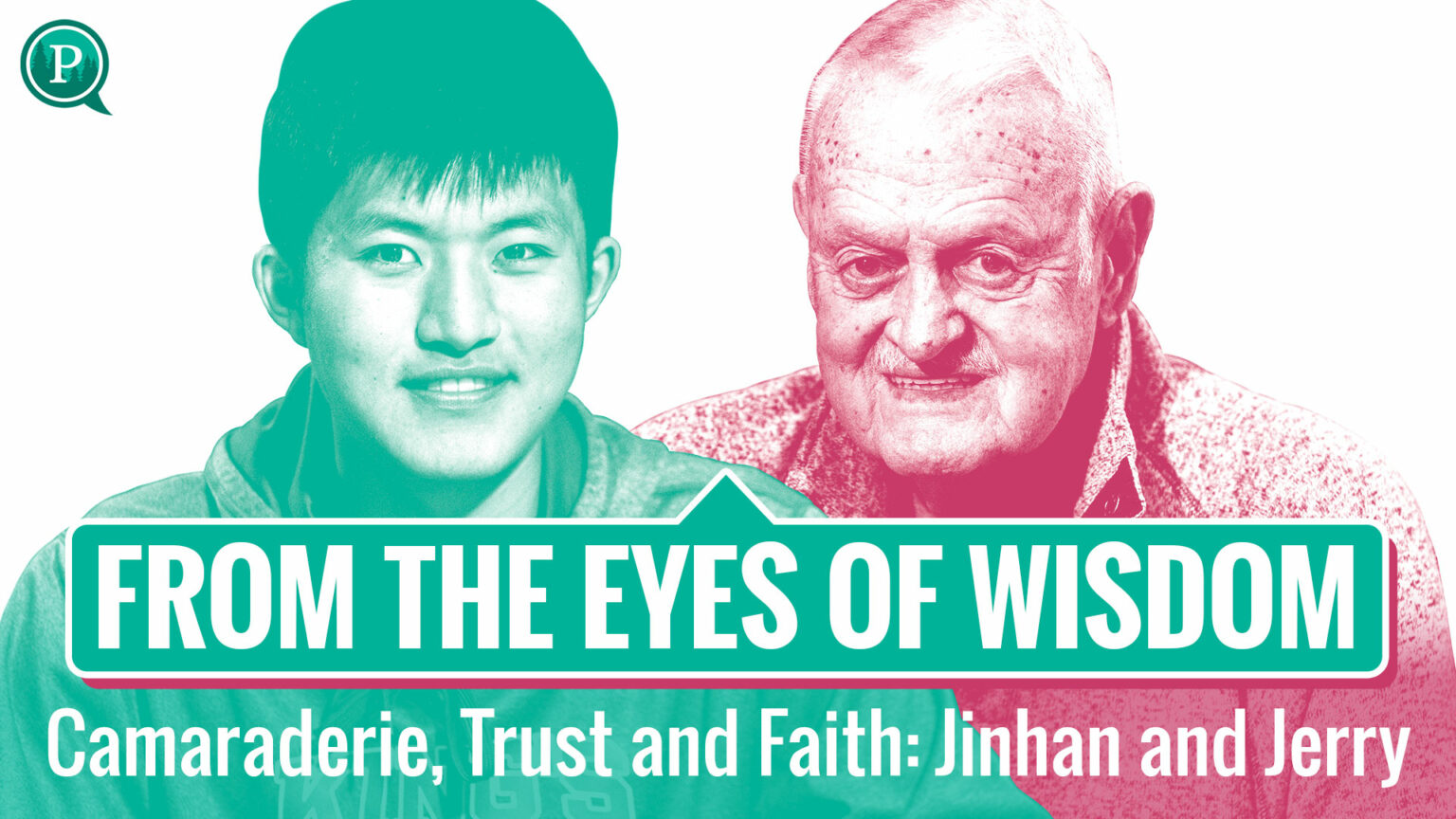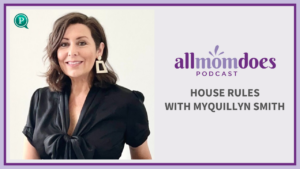This week’s conversation is with Jerry and Jinhan. Jerry shares his experiences as a police officer and the importance of camaraderie, trust, and faith in God. He encourages Jinhan to let God lead his life and to value real-life relationships over digital ones. Jinhan fears not finding his purpose in life, which Jerry speaks into, sharing how he found purpose in his career as a police officer. A great conversation about the importance of learning from the wisdom of elders and the value of real-life experiences and relationships.
Find Out More:
CRISTA Senior Living | King’s Schools | CRISTA Media | CRISTA Ministries
Transcription:
Sherri Lynn:
Have you ever wished you could know what the future held before you got there? What if you were given the gift of knowledge before you even began your journey? Now, I’ve been thinking about that because I made a lot of stupid mistakes when I was younger, and I wish I had someone to say, “Don’t go down that road. Go down this one.” I’m Sherri, and welcome to From the Eyes of Wisdom, where we are pairing an experienced elder from CRISTA Senior Living with a passionate King’s High School student ready to launch into the world. And while these conversations won’t tell the future exactly, they did reveal a lot we weren’t expecting about how to live life well. Are you ready? I can’t wait for you to hear this.
All right. Here we go with another episode of From the Eyes of Wisdom, and this is when we pair a, we’ll call you an elder. Is that okay, Jerry?
Jerry:
That’s fine.
Sherri Lynn:
You feel like an elder?
Jerry:
I fall into that class.
Sherri Lynn:
An elder statesman, with a student that’s ready to launch out into the world. How’s that, Jinhan?
Jinhan:
That sounds good to me.
Sherri Lynn:
Still that good? Okay. We’re going to pair you guys together and get some wisdom, have some questions, and just talk about life. Is that good?
Jerry:
Good.
Sherri Lynn:
All right. So Jerry, you went to King’s, didn’t you?
Jerry:
Yes, I did.
Sherri Lynn:
And you are currently a student in King’s?
Jinhan:
Yes.
Sherri Lynn:
Okay. Now, I have here that you were sort of a bad boy. Is that right?
Jerry:
Maybe some people’s opinion.
Sherri Lynn:
I have that written down here.
Jerry:
It depends on who you’re talking to.
Sherri Lynn:
Okay. So maybe not a bad boy, but tell me a little bit about being at King’s.
Jerry:
Well, we were typical kids.
Sherri Lynn:
Okay. Yeah.
Jerry:
We had a good, well-rounded bunch from actually all over the state, although the school was not near as big at that time.
Sherri Lynn:
Right.
Jerry:
Ended up out here. I was going to Ballard High School, and my parents, Christians, thought that that might be a little bit too wild for me.
Sherri Lynn:
Okay. Is that where this bad boy came in that I have on my card?
Jerry:
That’s where the bad boy comes in.
Sherri Lynn:
Okay. That’s where the bad boy came. Just wanted to know where we got that.
Jerry:
Yeah.
Sherri Lynn:
You met your wife at King’s. Am I right?
Jerry:
Yes, I did.
Sherri Lynn:
Okay. You want to tell me how that happened?
Jerry:
Well, she came up from California, from LA, and she would put in here. I met her. We dated for several years, and after we both graduated, we married.
Sherri Lynn:
Wow. What made you say, this is her, this is who I want to marry?
Jerry:
Because I don’t know. I don’t know. But it truly ….
Sherri Lynn:
You felt it immediately.
Jerry:
I did.
Sherri Lynn:
Yeah.
Jerry:
I did. I saw her and I told my friend that was with me when I was checking in at that time and going through the routine enrollment, I said, “I like that girl.” I said, “She’s going to be my girl.”
Sherri Lynn:
Yeah? Right from the beginning.
Jerry:
And here we go, 65 years later, and she still is.
Sherri Lynn:
Oh, I love that. If you would tell Jinhan one thing that he should look for in a girlfriend, that this is the quality, 65 years he’s been married, 65 years. He knows. One quality that he should be looking for.
Jerry:
Well, I think number one is how you get along together, you can talk, you have fun together, and just the normal routine of high-school kids nowadays, just going out together and having a good time. And I think it all begins there and then it escalates.
Sherri Lynn:
Okay. That’s really good advice, Jerry, because from what I have seen, there always seems to be a lot of drama.
Jinhan:
Yes. Yeah.
Sherri Lynn:
So his advice is like, can we get along?
Jerry:
Yeah.
Sherri Lynn:
Can we just have a good time?
Jerry:
That’s right. That’s right.
Sherri Lynn:
Does there have to be a lot of drama? Does there have to be a lot of …?
Jerry:
If you can’t get along now, you’re not going to get along later.
Sherri Lynn:
That’s good wisdom.
Jerry:
[inaudible 00:04:21].
Sherri Lynn:
All right. So Jinhan, how long have you been going to King’s?
Jinhan:
I came here when I was in fifth grade, so this is my sixth year now.
Sherri Lynn:
Okay. All right. So you’ve been here for a while.
Jinhan:
Yeah.
Sherri Lynn:
Okay. How do you like it? Tell me about your experience here.
Jinhan:
I really like it here, especially in high school. That was where I started getting a lot of my friends, a lot of the people that I hang out with, and I think it’s a really cool community.
Sherri Lynn:
Okay. Now, where do you see yourself when you graduate? What do you want to be? Where do you want to go?
Jinhan:
One of the colleges that I’m looking at right now is West Point, which is the military academy.
Sherri Lynn:
Yeah.
Jinhan:
I think that could be cool.
Sherri Lynn:
Okay.
Jinhan:
Yeah.
Sherri Lynn:
And you want to be …. When you go there, do you have a specific focus that you want to …?
Jinhan:
No. One of the nice things about West Point is that you can go in undecided for the first year.
Sherri Lynn:
Okay.
Jinhan:
Everyone goes in undecided first year.
Sherri Lynn:
So this would be the military. I’m not versed in it at all. So you’d be entering the military.
Jinhan:
Yeah.
Sherri Lynn:
Okay. That’s cool because Jerry was a police officer for how many years?
Jerry:
Twenty-eight.
Sherri Lynn:
Okay. So these are both kind of serving roles, right? Serving 28 years, Jerry. When they were talking about you being a police officer, I was very interested in the fact that one of my best friends is in human resources. And I think about it the same way, and I think it would be same way even being in the military. We are believers in Jesus. I always tell her, as a human resources person, you see why the gospel is necessary. You see why Calvary needed to be so bloody because you see the worst of things. Right?
Jerry:
That’s right.
Sherri Lynn:
And I think being a police officer and having to serve people when they’re kind of at their worst. Right?
Jerry:
That’s right.
Sherri Lynn:
How did you stay positive? Or did you? Or did you become cynical?
Jerry:
To a degree, I think we all do. I think you get to the point, where you’ve had enough.
Sherri Lynn:
Yeah.
Jerry:
You can get beat down and beat down, and you just feel beat down.
Sherri Lynn:
Yeah.
Jerry:
And it gets you down. But then you just have to pick yourself up again and say, “Hey, I got a job to do.”
Sherri Lynn:
How does he, because he is going into the military. There’re going to be some beat-down days. I’m not trying [inaudible 00:07:00], Jinhan. Okay? We’re just trying to give you some wisdom, right? So when you get in there, you’re going to feel that. I want you to remember this conversation with Jerry, right? When he feels those beat-down days, what does he have to draw on? What does he have to remember, Jerry? What did you draw on? What did you have to remember?
Jerry:
Well, you’ve got to realize you have a God and you have faith and you look to Him. You ask Him for help through the tough times. He’ll get you through.
Jinhan:
Did you ever lose faith?
Jerry:
No, I never, never, never. I grew up in a Christian home. I was fortunate to have parents praying for me. It’s probably the only reason I’m here today, that I survived, and I appreciate it. God had His hand in my life, and He led me right up to here to this podcast today. It’s part of my life, and I accept it, and I’m ready to go on from here, whatever more is expected of me.
Sherri Lynn:
Wow. What was the scariest thing you saw?
Jerry:
Well, I was shot at a couple times. That’s not real fun. I was probably ….
Sherri Lynn:
You mean bullets are flying past and you’re like, “This is great. I’m really happy that this is happening to me right now.”
Jerry:
Yeah. I was doing a narcotics search warrant. I was working drugs at the time. I had a fella take a shot at us in the hallway of a house. He was 20 feet away from me, and he put it right into the door jamb over my head. It was three o’clock in the morning, dark, and I knew I’d been hit because I was that close. I dove back into the living room, and I’m just feeling for blood. I know I’ve been hit, but thank God I hadn’t been. I don’t know how I survived that one, but I did. He came through and everything turned out all right. I had another incident where we did a search warrant, narcotics, go through a door, and I got a guy with a gun face-to-face to me. He had the opportunity to shoot me. I had the opportunity to shoot him. I should have, because I gave him a chance to kill me. And that’s one of the things that you’re taught in law enforcement. If they have a gun and they’re pointing it at you, you don’t hesitate.
Sherri Lynn:
Yeah.
Jerry:
But thank God I didn’t. And that man, we turned around, we got him off of drugs, we got a good job back for him. I flew down. He did a couple of search warrants for us. He did what we called the main man. He made the buys, and then we had to ship him out of town to protect him. I flew down to New Orleans and picked him up and came back. And it was kind of interesting on the plane, on the way back, I had a lot of time to talk to him. I said, “Why didn’t you shoot me, Bick?” His name was Bick. I said, “Why didn’t you shoot me? I was just wondering. You had the opportunity.” He said, “Well, Jerry, I couldn’t. My brother is a policeman also.” And he said, “I couldn’t shoot you.” We turned him around, got his Siemens paper back after he testified, and it all turned out for the good.
Sherri Lynn:
Wow. Not often that I’m speechless. I think that it’s a testament of God’s hand always on your life, even when you don’t have time. Like the guns in your face, you don’t have time to be like, “Our Father, which art in heaven, hallowed be thy name, thy kingdom come ….” His presence is with you because you’re His, right?
Jerry:
Right.
Sherri Lynn:
He’s here with you and He’s protecting you.
Jerry:
That’s right.
Sherri Lynn:
Because you’re His. Am I making sense, Jinhan?
Jinhan:
Yeah.
Sherri Lynn:
You see what I’m saying?
Jinhan:
Yeah.
Sherri Lynn:
I belong to Him, and He’s protecting me. And I don’t have to cry out right now because He’s with me right now.
Jerry:
That’s right.
Sherri Lynn:
And I think that’s something really powerful to take with you in that story is that God’s obvious obligation to His children in that very tense moment, fearful moment. Can I ask you a question?
Jinhan:
Yeah.
Sherri Lynn:
What, right now, thinking 10 years ahead, okay, 10 years ahead.
Jinhan:
Okay.
Sherri Lynn:
So you’re 27?
Jinhan:
Twenty-seven.
Sherri Lynn:
Twenty-seven. What’s your biggest fear?
Jinhan:
I guess my biggest rational fear is still not being able to find where I’m supposed to be. It’s not necessarily being happy, but being somewhere that I fit in or maybe not finding a purpose. I guess that’s it.
Jerry:
That’s a good point.
Jinhan:
Yeah. Because I don’t want to wander aimlessly around, trying to do things that I’m not supposed to.
Sherri Lynn:
Okay. That’s fair. Let me ask you this, Jerry. Did you go into being a police officer, thinking this is my purpose?
Jerry:
Yes, I did.
Sherri Lynn:
Okay. Did you grow up wanting to be a policeman?
Jerry:
No.
Sherri Lynn:
No. Okay.
Jerry:
No, not really. I was influenced by a friend. I was working in the construction business, in business with my brother in the drywall industry.
Sherri Lynn:
Yeah.
Jerry:
And I worked there for about five years and just felt like no purpose.
Sherri Lynn:
What? Do you just …?
Jerry:
Yeah.
Sherri Lynn:
Okay.
Jerry:
There’s no …. I want a job that I feel like I have a purpose in life that I can maybe help somebody and maybe have satisfaction in my own life.
Sherri Lynn:
Yeah. Yeah.
Jerry:
And I found it there. I really did. A lot of people say, “In police work?” Well, I’ll tell you what, it has been a good job to me. I only worked the streets for about five years, and then after that, I was in plain clothes throughout the department. I ended up in homicide for 12 years. But I met some very influential, very interesting people through my career.
Sherri Lynn:
Yeah.
Jerry:
People that I would’ve never met or had the opportunity. And I’m thankful, I’m grateful. When I look back now, I’m not sorry one bit for ….
Sherri Lynn:
No regrets.
Jerry:
I know. I think I did the right thing. I made the right move.
Sherri Lynn:
Okay. And so would you say to Jinhan, I made that move not knowing how good it was going to be. I just felt like, “Hey, this will give me some purpose,” and then God just kind of unfolded it from there.
Jerry:
Very well put.
Sherri Lynn:
Okay. When I talk to young people in your generation, there’s so much pressure to find out what am I supposed to be doing? Where am I supposed to be? And then I talk to people in Jerry’s generation, and I hear people like Jerry saying, “Oh, I was doing drywall, and then I felt like I want some purpose, so I went and became a police officer. And then God did this, and then He did that and then that and that.” And there’s no plan or map. It’s just waking up open to God being in your life.
Jerry:
Exactly.
Sherri Lynn:
Does that make sense?
Jerry:
Exactly.
Sherri Lynn:
Am I …?
Jerry:
Let Him lead.
Sherri Lynn:
God doesn’t follow well. I’ve learned that.
Jerry:
That’s right.
Sherri Lynn:
Yeah. He doesn’t like following us.
Jerry:
If I could give you any advice, I think that would be number one.
Sherri Lynn:
What is it?
Jerry:
Let Him lead you.
Sherri Lynn:
Let Him lead you and trust that leading.
Jinhan:
While you were on the job as a policeman, there must have been moments where you were scared, right?
Jerry:
Oh, definitely.
Jinhan:
Yeah.
Jerry:
Yeah, definitely. I wonder, what am I doing here?
Sherri Lynn:
Yeah. So he’s saying overall, you look at the picture and you’re like, “I have no regrets.” But in a moment, can you remember a moment where you’re like, “I probably should have picked a different …?”
Jerry:
Oh, I ended up in the hospital a few times.
Sherri Lynn:
Oh, really?
Jerry:
Oh, yeah. I was responding to a burglary up on Queen Anne Hill, three o’clock in the morning, and walked in a door in a dry cleaning establishment, got hit across the face with a wine bottle and decked a full …. That put me in the hospital for a couple days. I had a couple other incidents where I ended up there. I mean, I got a few bruises to show for it, but I figure that’s part of the job. I guess you learn, if possible, but you can’t cover yourself completely. You’re open to that type of a thing, and that’s where you just pray each day that God will protect you and He’ll take care of you.
Sherri Lynn:
How did your wife handle you leaving the house every day?
Jerry:
When I was working homicide, we’d get called out often at two, three in the morning.
Sherri Lynn:
Oh, wow.
Jerry:
She had to hear that phone ring.
Sherri Lynn:
Yeah. Yeah.
Jerry:
She didn’t like that, nor did any of us, but it was part of the job. No, she never really complained. She was good. We had a lot of friends on the department. She met a lot of the wives. We skied together all over. We had a club, so they’d get together. It was a close-knit group.
Sherri Lynn:
Can you talk about how important it was, specifically on the force? Because if you’re going into the military, it’s the same kind of thing, where it’s shoulder-to-shoulder working with people and these deep relationships that you’re going to have to form because you’re doing these tasks together, completing these tasks together, shoulder to shoulder. How important were those relationships and how important would you tell Jinhan it is to form these bonds with these people and keep them?
Jerry:
Oh, it was very important, and I do keep them. I’ve got friends that we have an annual banquet, a retired officer’s banquet, every year. There would be up to 400 people there, we had it here in November, friends that they go back probably 40 years, 30, 40 years. We’re still friends, and we get together. We’ll have get-togethers occasionally and birthday parties or whatever. There’s quite a camaraderie. It’s something that I think they’re lacking in the departments today. I don’t think they have the camaraderie, and that’s important.
Sherri Lynn:
It is.
Jerry:
That’s important in police work like that. And it is in military also, you’ll find that. You’ll have camaraderie there. You’ll be making friends. I did three years in the Air National Guard. So I had a little taste of military life, too. You form friends, and you learn to trust each other. And some of those friendships carry on for maybe the rest of your life. And some of them are gone after the time you serve, but they’re good. They’re good for you. You’ll have that, and you’ll see that. Especially here, where you’re going to West Point, you’ll be going to school with them.
Jinhan:
Yeah.
Jerry:
It’s a little different than, I guess, military training, where you’re out in the wilds. A lot of your time will be classwork time, which is good.
Jinhan:
Yeah.
Jerry:
It’s a good career. I think you’re being very thoughtful. I think it’s a good career. I think it’s good for you at your age now to be thinking along that line. That’s important because a lot of kids nowadays, they go into school, they go into college, they don’t know what they’re going to do. They come out of college and they don’t know what they’re going to do. And they wasted a lot of their life already.
Sherri Lynn:
That’s very true.
Jinhan:
So Jerry, you said that when you were in the police force, you built a lot of camaraderie, but you don’t see that in today’s police force.
Jerry:
Yeah, I don’t. I don’t see it, and I don’t understand it. I really don’t. And I don’t know why. I guess a prime example is every year at our annual retired banquet, the new retirees are introduced. And they had at our banquet in November now, we had like, oh, I can’t remember the exact number, but it was probably 30 or 40 new retirees. And out of that 30 or 40 retirees, to get their retirement badges, there were only about 10 of them showed up.
Jinhan:
Oh.
Jerry:
They didn’t even show up for it.
Sherri Lynn:
Really.
Jerry:
That’s kind of an example of what I’m referring to.
Sherri Lynn:
That’s a cultural thing. I think in our culture, relationship, as far as friendship and relating to one another, is not as important. I think we’re breaking apart. I think we don’t trust each other.
Jerry:
That’s right there. I think they just don’t trust each other.
Sherri Lynn:
Yeah.
Jerry:
And like you say, I think it’s a cultural thing that we’ve established. People don’t trust each other anymore.
Sherri Lynn:
We don’t trust each other.
Jerry:
And that’s sad.
Sherri Lynn:
It is. And I’ve said, and I love what you’re saying, and I think that’s an important thing to remember, Jinhan, is to say, fight for friendship, fight for relationship.
Jinhan:
Why do you think that is, that relationships are breaking down?
Sherri Lynn:
Jerry, what do you think? I’ll go to you first.
Jerry:
I think it’s the world, in general, right now. It’s the world relationships. We’re not trusting China. We’re not trusting anybody. Russia, they’re fighting. Everybody’s fighting everybody. Nobody’s trusting anybody.
Sherri Lynn:
Yeah.
Jerry:
And everybody’s turning on everybody.
Sherri Lynn:
Everyone’s suspicious.
Jerry:
It’s like, “What’s going on?” There’s no common sense anymore.
Sherri Lynn:
Yeah. That’s good. There’s no common sense anymore. I know everyone’s like, “Oh, social media’s terrible. Social media’s terrible.” There’re a lot of good things about social media, I suppose. But I will say that it gives you a false sense of community. You have a digital community that you think are your friends, so you feel connected, but you’re not. You’re scrolling. You see, oh, look, so-and-so was at the mall yesterday. Oh, look, so-and-so had vacation yesterday. And you feel like you’re connecting with them, but you’re not. She didn’t tell you, “I had so much fun at the lake yesterday.” So you didn’t really connect. And so it’s a false sense of connection. And so you end up lonely because we were built to relate to each other.
Jerry:
Exactly.
Sherri Lynn:
We were built to go golfing with each other. And so you end up not having that. So then when you do want to go golfing with someone, you don’t have anybody.
Jerry:
That’s right, yeah.
Sherri Lynn:
And so all you have is yourself on Instagram, taking a picture of yourself. So I think that that digital world has built a false sense of community.
Jerry:
Definitely.
Sherri Lynn:
And I think what Jerry is saying is something that would be really good for you to remember is have real community. You know what someone said to me the other day? She said she has to stop using her phone with her kids. She has little kids. And she said that someone told her when she’s in front of her kid, and when you’re listening, I’m not judging you if you do this, I’m just telling you what a friend told me. She said, when she’s in front of her kid, someone told her, and she has her phone in front of her kid, what she’s saying to her child is, “I wish I was somewhere else.” And I think that if we’re not relating to each other …. It sounds like, Jerry, you were in-the-moment person. When you were sitting with people, you were looking them in the eye and you were with them. I’m with that person. We’re talking.
Jerry:
I try to be.
Sherri Lynn:
We’re relating. Yeah, with your friends.
Jerry:
That’s important. Yeah.
Sherri Lynn:
I think that you would’ve had to have been, or you still wouldn’t have these relationships with people that you’re going golfing with.
Jerry:
Yeah. Yeah.
Sherri Lynn:
You have no regrets?
Jerry:
No, I don’t. I don’t know that I’d have done anything different than I have really done. I mean, there are a few things, yes, financially, that I made that I could’ve done better, if I had a few investments and whatnot. Yes, there were regrets there, but that was maybe just bad thinking or bad luck or I don’t know.
Sherri Lynn:
But overall, you feel like, “Hey, I’ve had a life well-lived.
Jerry:
I have. I have. I’ve had a very interesting life. I still have some left. Next week, I’m going to Chelan with old friends, and I am going to have a good time.
Sherri Lynn:
Oh, I love that. I love that.
Jinhan:
That’s amazing.
Sherri Lynn:
It is. Jinhan, do you have any other questions for Jerry? This is a wise man in front of you.
Jinhan:
Yeah, I have one more.
Sherri Lynn:
Okay.
Jinhan:
So when you were in the police force, were you able to choose which department you go into?
Jerry:
I worked all over. I started out in patrol, in uniform, which is normal, and I worked in uniform for about five years. After that, I jumped into almost every detective division there was. I went into auto theft, went into burglary, went into intelligence, which was a great job. That was during the anti-war demonstrations. That was a great job.
Sherri Lynn:
Okay.
Jerry:
And then I went into narcotics and then eventually ended up robbery and then went into homicide.
Sherri Lynn:
Wow.
Jerry:
So ended up the last 12 years in homicide.
Sherri Lynn:
So you did it all.
Jerry:
So yeah, I had a good career. I covered pretty much all and got my feet wet in a little bit of every division.
Sherri Lynn:
Wow.
Jerry:
But I was fortunate, too. I had a pretty good ride on the department. Because of my golfing abilities, I played on the golf team, which we traveled around. And a lot of the chiefs and a lot of the higher ups get to know you, and sometimes it’s not what you know, but it’s who you know.
Sherri Lynn:
All right. Write that down on the card, Jinhan, play golf.
Jinhan:
Play golf [inaudible 00:27:13].
Sherri Lynn:
Let God lead, play golf. There we go.
Jerry:
That’s good.
Jinhan:
All right. Play golf.
Jerry:
Very good. Very good.
Sherri Lynn:
That’s what we’ve taken away from here, okay?
Jerry:
But that’s true. A lot of times it’s not what you know. It’s who you know …
Sherri Lynn:
I love that.
Jerry:
… in this life.
Sherri Lynn:
Guys, this was such a great conversation. I had such a great time. I hope you got some good wisdom.
Jinhan:
Absolutely.
Sherri Lynn:
Usually, I take this time and I hand the card and I hand the pen, and I have the person give one great piece of wisdom, but you have given so much wisdom. We’ve already taken down so many notes. So thank you, Jerry, for sharing your life with us and sharing your wisdom with us.
Jerry:
Thank you.
Sherri Lynn:
I appreciate it. And Jinhan, hopefully, you’ve gotten some stuff.
Jinhan:
Oh, yeah.
Sherri Lynn:
We can check in with you 10 years from now. I feel pretty confident you’re going to be walking in great purpose and doing great things and serving people and having a wonderful life that God is using you.
Jinhan:
I hope so.
Sherri Lynn:
I believe that. You believe that, Jerry?
Jerry:
I believe that.
Sherri Lynn:
I believe that.
Jerry:
He’s got a lot going for him.
Sherri Lynn:
Yeah, I believe that. All right, everyone, thank you so much for joining us with From the Eyes of Wisdom. That’s our episode for today. I think we’ll have an episode next week, but we may not. And if we don’t, goodbye forever. I’m just kidding. That’s it. I do that every time. Thank you guys, and we’ll talk to you next episode.







